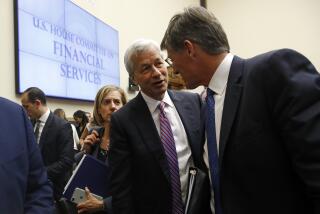German Leader Gets a Thumping as Anti-Tax Tune Tops the Charts
- Share via
BERLIN — BERLIN -- It’s a fast little ditty at the top of the German pop charts. It’s not about love. It’s not even about lost love. It’s about one of the least favorite people in the nation today, Chancellor Gerhard Schroeder, who just two months ago promised so much to get reelected.
Using a syncopated rap beat, “The Tax Song” skewers the chancellor as a sneaky flimflam artist with his hands on the worker’s wallet. “Promises that were made yesterday can be broken today,” sings satirist Elmar Brandt, mimicking Schroeder’s gravelly baritone. “I’ll raise your taxes, I’ll empty your pockets. Every one of you bums stashes some cash away, but I’ll find it no matter where it is .... I’ll get your piggy bank.”
The scathing lyrics have struck a chord in a nation whose soul and economy are under siege.
“What can you do?” said Mario Altermann, a $5-an-hour construction laborer with dust in his beard. “The small guy never has a chance. The worker pays the bill. They should cut the incomes of those fat government deputies .... There’s nothing I like about Schroeder. That song captures how we feel.”
Even by the standards of their somber country, locked now in the fog and drizzle of autumn, Germans are a gloomy lot. Unemployment is nearly 10%. Budget deficits balloon weekly. Unions are threatening strikes. There are proposals to raise taxes on everything from heating oil to stock portfolios. The other day the government floated the ideas of forcing workers to contribute more to pension funds and of lifting the tax on false teeth from 7% to 16%.
The economic crisis is forcing Germany to confront years of expensive social policies and the continuing heavy costs of absorbing the eastern regions. There’s even talk that the German welfare state -- the European epitome of cradle-to-grave coddling -- will have to get more miserly. Schroeder and his economic experts, known as the “five wise men,” were supposed to fix it all, but whenever Finance Minister Hans Eichel appears on TV, the news is bad and the solutions painful.
The German psyche is bewildered. The world’s third-largest economy, Germany two years ago was the financial engine of the continent, before Europe began merging its currencies under the euro. Germans despaired over giving up their beloved deutschemark and complained about entering a union with such economic laggards as Italy and France. Today, Germany is the sick one. Its projected economic growth is 0.2% this year and its budget deficit of about $35 billion puts it in violation of European Union standards.
Schroeder evaded detailed plans on taxes and economic reforms during the campaign. Many of those who voted for him now say the chancellor pulled a fast one. But economists and others contend that Schroeder has few options, especially with consumers spending less and seemingly endless reports on bankrupt companies crowding the business pages.
Schroeder’s approval rating has slid to 34%. He attempted to project confidence when he recently announced a package of economic reforms during a news conference. His usually jovial bantering with reporters was not in evidence when someone asked the chancellor if he had heard “The Tax Song,” which also has a video that depicts a safe falling from the sky and squashing a caricature of a cigar-smoking Schroeder.
The chancellor snapped: “I don’t intend to comment on this.... I wish we’d have more unemotional debates in this political fight” to solve the country’s problems.
That’s not an easy task when newspaper headlines read: “Taxman Ambushes Santa Claus.”
For many Germans, “The Tax Song” is a jangling interlude to soften the pain. Moving between a rap riff and fast guitars and drums, the song reached No. 1 on the charts earlier this month, selling more copies than Madonna and Ozzy Osbourne.
Taking a break from repairing elevators in office buildings, Andre Peters said higher taxes will sting. But he added that for decades the German government has lacked the will to reform the economy and reduce the strain of Europe’s most generous welfare state. Even Schroeder’s prescription of tax hikes is considered by many economists to lack the fundamental change needed to free industry from the grip of social programs and powerful unions.
“Germans must understand they must cut down on things,” said Peters, sipping coffee in a small diner under a train trestle. “It’s too expensive, and we can’t afford it anymore.”
Around the corner, not far away, Dieter Krause-Pitrowski pushed a shopping cart in a discount grocery. He’s a disabled construction worker. He’s not in favor of reducing the welfare state, but he sure was mad at Schroeder, the man he voted for in September.
“I feel betrayed,” Krause-Pitrowski said. “Everybody is mad. But no one does anything. There’ll be no revolution.”
“The Tax Song” says the chancellor will enact a “dog tax, tobacco tax, car and environmental tax.” One line pokes fun at what has become a lingering German question: Does Schroeder color his hair?
“Why not have a tax for bad weather? That would bring a lot of money,” sings Brandt, sounding just like the chancellor. “Or a tax for dying your hair, er, no, better not.”
More to Read
Sign up for Essential California
The most important California stories and recommendations in your inbox every morning.
You may occasionally receive promotional content from the Los Angeles Times.












